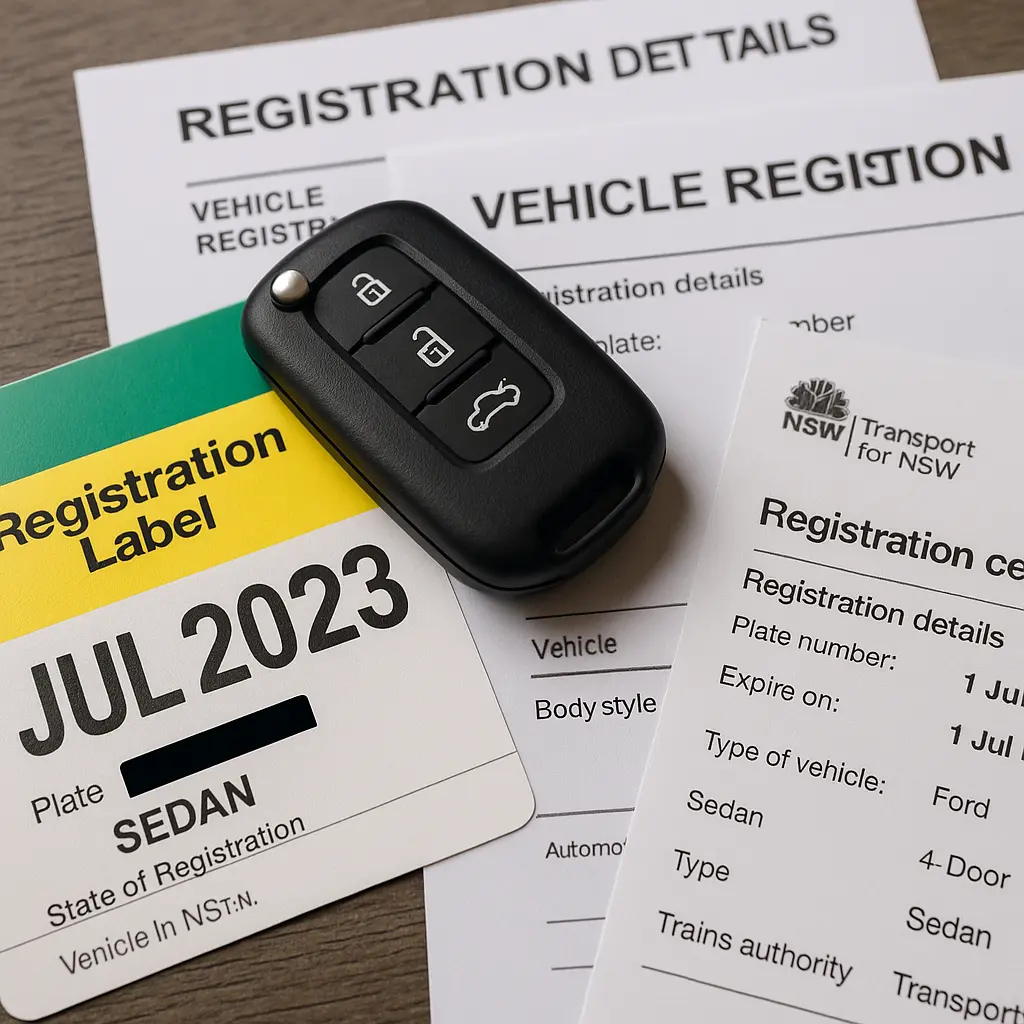Understanding Rego Check Results – What Each Section Really Means
Buying a car in Australia—whether new or used—often involves navigating a few administrative hurdles. One of the most essential tools in this process is the rego check. Short for registration check, a rego check provides comprehensive data about a vehicle’s legal registration, compliance, and sometimes even its mechanical history.
Yet, many car buyers or owners don’t fully understand what the details in a rego check mean. So, in this detailed guide, we’re going to break down every section of a rego check report, explain why each one matters, and help you make better-informed vehicle decisions in 2025.

🚗 What Is a Rego Check?
A rego check is an official record of a vehicle’s registration status in Australia. It can include details like:
Whether the vehicle is currently registered
Expiry date of the registration
Make, model, and body type
Engine and VIN (Vehicle Identification Number)
Compliance and inspection status
Stolen or written-off status
Previous registration history (in some states)
In most states, including NSW, VIC, QLD, and WA, rego checks are free and available online via government or authorised platforms. You only need the number plate to run one.
🧾 Why Rego Checks Matter (Especially in 2025)
In 2025, with the rise of secondhand electric vehicles, imported cars, and grey-market performance vehicles, buying without checking the rego is risky. Here’s why rego checks are crucial:
✅ Verifies ownership legitimacy
✅ Confirms registration is current
✅ Reveals if a car is written off or stolen
✅ Helps assess fair market value
✅ Aids in checking for odometer fraud
✅ Prevents unintended fines for driving an unregistered vehicle
Now, let’s dive into each section of a standard rego check report and break down what it means.
📄 Section-by-Section Breakdown of a Rego Check
1. Vehicle Registration Status
This is the first and most important field in any rego report.
What it shows: “Registered,” “Expired,” or “Cancelled”
Why it matters: If it’s unregistered, you cannot legally drive it.
Watch out for: Cars that are technically "expired" but still sold as if fully roadworthy.
Pro Tip: Always check the expiry date. A car expiring in days may require immediate action or negotiation.
2. Registration Number
This field confirms the number plate matched against state records.
Why it's important: Ensures the plate matches the chassis and engine—it’s an identity check.
Watch out for: Rego mismatch. If the number plate doesn’t align with VIN or chassis details, it’s a red flag.
3. Registration Expiry Date
Key for buyers: This tells you how long you have before needing to renew.
In some states: Rego is 6 or 12 months; dealers often use this to entice buyers (“6 months rego included”).
4. Make, Model, Year
What it shows: Manufacturer, model, and year of manufacture
Cross-check: Ensure this aligns with the vehicle’s compliance plate and logbooks.
Common scam: Selling a car as a 2020 model when it was manufactured in late 2019.
5. VIN (Vehicle Identification Number)
This 17-character code is the car’s unique fingerprint.
Match it with the compliance plate, logbook, and insurance.
If it doesn't match: The car may be rebadged, stolen, or illegally modified.
6. Engine Number
Less unique than VIN, but still critical.
Why it matters: Helps detect if an engine swap occurred (important in performance or rebuilt cars).
Tip: Especially important in turbocharged or tuned vehicles.
7. Body Type
Sedan, hatchback, SUV, ute, coupe, wagon, etc.
Why check this: Some high-performance vehicles are re-shelled; incorrect body type may mean illegal modifications.
8. Fuel Type
Petrol, diesel, electric, hybrid, LPG
Relevance in 2025:
EVs and hybrids are more common.
Useful for checking eligibility for tax rebates, road toll discounts, or compliance with emission zones.
9. Green Slip / CTP Insurance Status
Not all rego checks will show this, but NSW and QLD often include it.
CTP = Compulsory Third Party insurance.
Check: Is the car covered at the time of inspection?
Red flag: If CTP is lapsed, you can’t drive it—even if registration is valid.
10. Stolen Status
This checks against national databases like NEVDIS (National Exchange of Vehicle and Driver Information System).
What to do if flagged: Immediately avoid the transaction and report to authorities.
A stolen vehicle can be seized by police even if you purchased it in good faith.
11. Written-Off Status
Rego checks often show if a car is:
Statutory write-off (can never be registered again)
Repairable write-off (can be registered with inspection and repairs)
In 2025:
With rising costs of repairs and floods, more cars are written off than ever.
Ask for proof of inspection if it’s a repairable write-off.
12. Odometer Reading
Some reports include a historical reading.
Compare it with the dashboard reading.
Mismatch = Possible odometer tampering.
13. Previous Registration State
If a car moved from NSW to VIC, for example, this section will show that.
Useful for understanding its driving history.
Flood-prone state? Extra caution if it came from QLD or Northern NSW during 2022–2024 floods.
14. Registration Conditions
Some vehicles may have conditional registration:
Agricultural use only
Historic/classic use (limited kms per year)
Left-hand-drive restrictions
Pro Tip:
A classic car with “historic” rego isn’t allowed for daily driving—don’t get caught out.
🧠 Common Misinterpretations (and What They Actually Mean)
| Misleading Field | What It Actually Means |
|---|---|
| “Registered” but CTP expired | You can’t legally drive it |
| “Repairable Write-Off” | Requires an official inspection before re-registration |
| No odometer info shown | Doesn’t mean it’s safe—it may have hidden tampering |
| VIN mismatch | Could indicate a stolen, cloned, or modified vehicle |
| “Current Rego” but expired soon | Buyer may have to pay rego within days |
📍 How to Run a Free Rego Check in Each State (2025 Links Summary)
NOTE: Don’t include links in your blog, but here's how to reference the process:
NSW – Use the Service NSW website
VIC – Via VicRoads Rego Check
QLD – QLD Rego Check via Transport and Main Roads
WA, SA, TAS – State-based portals
You’ll typically need just the number plate. Some checks allow VIN-based search, which is more reliable.
✅ Additional Paid Checks to Consider
Free rego checks are great, but for serious buyers, these extra checks are worth it:
🔍 PPSR (Personal Property Securities Register)
Checks for finance owing
Confirms if the vehicle has a loan against it
🛠️ Vehicle History Report
Odometer inconsistencies
Write-off history
Service intervals
Past registration changes
📌 What to Do if Something Looks Off
If anything seems suspicious during a rego check:
Ask the seller for documentation – logbooks, compliance certificates
Run a PPSR check – it's under $5 and can save you thousands
Request a mechanic inspection
Walk away if VINs or engine numbers don’t match
📘 Quick Glossary for Newbies
VIN: Vehicle Identification Number
CTP: Compulsory Third Party Insurance
Statutory Write-Off: Can’t be registered again
Repairable Write-Off: Can be registered post-inspection
NEVDIS: National Exchange of Vehicle and Driver Information System
🧭 Final Tips for Rego Checks in 2025
Always run a rego check before paying any deposit
Double check CTP insurance validity
Match VIN, engine, and rego plate
If it’s too cheap, check for write-off or finance issues
Look beyond just “Registered” — it’s the deeper sections that matter
🔚 Conclusion: A Must-Do Step for Every Car Buyer
A rego check isn’t just a formality—it’s a critical safety and legal tool in the car buying journey. In 2025, with rising private sales, grey imports, and electric vehicles entering the used market, being able to decipher each line of a rego check can save you from buying a lemon or dealing with legal hassles.
Whether you're a first-time buyer or an experienced trader, make rego checks part of your non-negotiable car buying checklist.
Leave a comment
Your email address will not be published. Required fields are marked *




















